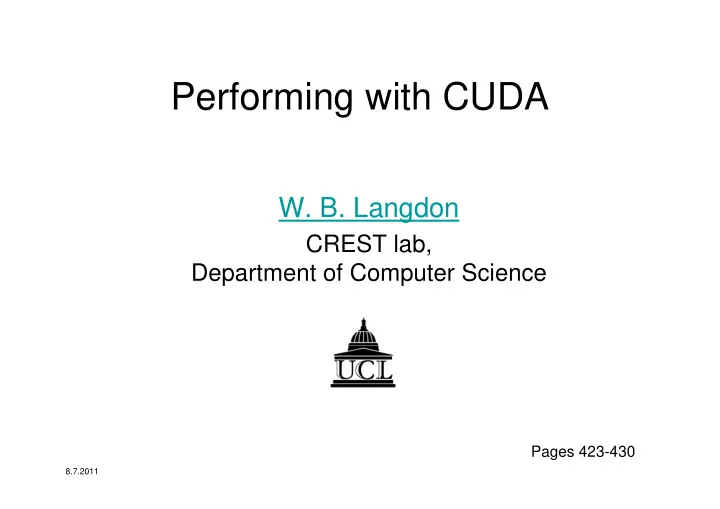

Performing with CUDA W. B. Langdon CREST lab, Department of Computer Science Pages 423-430 8.7.2011
Introduction • Initial steps • Concentrate upon what is different about high performance with GPU: – Many threads – Finding and avoiding bottlenecks • Conclusions W. B. Langdon, UCL 2
Before you code • How much of your new application will be run in parallel? If <90% stop . • EA called “embarrassingly parallel” • If big population: one thread per member • May be hard to parallelise fitness function • How much of GPU’s speed, memory do you need? (Advertised performance is best possible) W. B. Langdon, UCL 3
GPU computing needs many threads Best speed ≥ 20× number of stream processors 4
GPU many threads hide latency W. B. Langdon, UCL 5
Bottlenecks W. B. Langdon, UCL 6
W. B. Langdon, UCL 7
Slowest step dominates • In a car you know if – Doing well, road is wide and smooth – In heavy traffic or road is narrow and bendy • With a GPU it is difficult to tell what is holding you back W. B. Langdon, UCL 9
Fermi C2050 PCI host ↔ GPU link always narrower bottleneck than GPU ↔ on board memory. Both can be important. W. B. Langdon, UCL 10
Locate Bottleneck in Design: Host PC ↔ GPU PCI Bus • PCI can be estimated in advance • Number bytes into and back from GPU per kernel call. • How long to transfer data (byte/bandwidth) • How long between kernel launches? – If <1millisec consider fewer bigger launches • bandwidthTest (see switches) gives PCI speed. W. B. Langdon, UCL 11
Other Bottlenecks • In theory can do the same for GPU-global memory transfers but. – Hard to do. – PCI can run at 100% usage (pinned memory) – Hard to predict fraction of usage inside GPU – What effect will caches have? – Enough threads to keep both processors and memory buses busy. – Atomic and non-coalesced operations may have unexpectedly large impact 12
Performance by Hacking • Measuring performance • Is performance good enough? Stop • Can it be made better? No: stop . • Identify and remove current bottleneck. • Measure new performance. What is new bootleneck? W. B. Langdon, UCL 13
Timing whole kernels on host Remember to use cudaThreadSynchronize. See examples in CUDA SDK sources.
Timing Kernel Code • Perhaps use GPU’s own clock • Alter kernel to do operation N+1 times instead of just once. – Time per operation ≈ extra kernel time/N • Ensure new code behaves same as old • Ensure nvcc compiler does not optimise away your modification • Results can be disappointing: less compute time may mean more time waiting for memory. 15
CUDA Profiler • Two parts – Counters on GPU, write data to host files – User interface to control which counters are active and display results • Linux Visual profiler not stable – Use spreadsheet, gnuplot etc instead • CUDA Profiler good for measuring: – Divergence – Cache misses (non-coalesced IO) – Serialised access to constant memory 16
Multiple GPUs • CUDA requires you to use conventional threads on host (eg pthreads). • Large overhead on creating GPU data structures on host. So: – Create CUDA data once at start of run – Create pthreads once at start of run W. B. Langdon, UCL 17
Other Approaches • Can you compress data. – eg send bytes across PCI rather than int • Can you keep data on GPU to avoid re-reading it? • Would it be better to re-calculate rather than re-read? W. B. Langdon, UCL 18
Conclusions • Design before you start. – Will non-parallel part prevent useful speedup? – Use lots of threads • Locate slowest step. Concentrate on it. • Slowest step usually moving data • Don’t be afraid to waste computation • Computation is cheap. Data is expensive W. B. Langdon, UCL 19
END http://www.epsrc.ac.uk/ W. B. Langdon, UCL 20
A Field Guide To Genetic Programming http://www.gp-field-guide.org.uk/ Free PDF
The Genetic Programming Bibliography The largest, most complete, collection of GP papers. http://www.cs.bham.ac.uk/~wbl/biblio/ With 7554 references, and 5,895 online publications, the GP Bibliography is a vital resource to the computer science, artificial intelligence, machine learning, and evolutionary computing communities. RSS Support available through the Collection of CS Bibliographies. A web form for adding your entries. Wiki to update homepages. Co-authorship community. Downloads A personalised list of every author’s GP publications. Search the GP Bibliography at http://liinwww.ira.uka.de/bibliography/Ai/genetic.programming.html
Recommend
More recommend